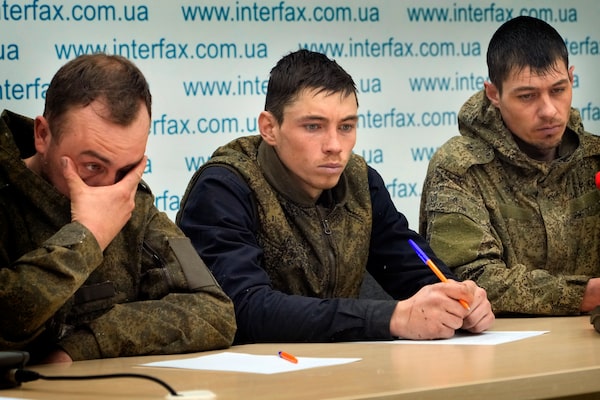
Among the major victims of the war between Russia and Ukraine are tens of thousands of young Russian men who have been marched across the border and into the line of fire without preparation. Russian soldiers have given press conferences on March 5, 2022 after being captured.Efrem Lukatsky/The Associated Press
Among the heartbreaking scenes from Ukraine are the videos of young Russian men, many in their late teens and early twenties, phoning their mothers in tears from a muddy field to say that they’ve been captured by the Ukrainians in a war they didn’t expect, and don’t understand or agree with.
These videos have their propaganda value, of course, and Ukrainian forces, by filming and posting such private moments, may be committing a minor violation of the laws of war, although the calls themselves are a humane gesture.
But they show us something that has become increasingly evident during the past two weeks of shambolic, unnecessary warfare: Among the major victims of this war are tens of thousands of young Russian men who have been marched across the border and into the line of fire without preparation or awareness that they were attempting the unprovoked military conquest of a country.
You’ll be forgiven if you don’t immediately think of Russian soldiers as victims in this conflict.
The failure of the Kremlin’s initial, delusional attempt at a quick infantry march on Kyiv means President Vladimir Putin’s invasion has now switched to more remote and destructive forms of warfare based on artillery, guided-missile, and air-bombardment attacks on cities.
But the estimated 150,000 infantrymen (Russia has hardly any women in combat) who poured across the borders of Russia and Belarus into Ukraine have shocked military analysts with their inexperience, lack of training or professionalism – and their frequent absence of the will to fight. Many are, to use a phrase many had thought obsolete, mere cannon fodder.
When Mr. Putin was in his early years as President, his military was said to be little more than a welfare scheme. It employed almost 1.5 million Russians, making it the world’s second-largest military, but analysts said most of it was incapable of being deployed in a military conflict.
Russia has a mandatory 12-month military term for all males aged 18 to 27. These conscripts make up the great majority of soldiers, and for years the Russian military was thought to be largely a make-work scheme to keep unemployed young men off the streets.
That was said to have changed after 2008, when Russia invaded Georgia, and especially in the early 2010s, when Mr. Putin embarked on a large-scale modernization of the military. Elite brigades and militias were professionalized, modern leadership and communications were implemented, and major investments were made in high-tech armaments.
Russian military activities in Syria in defence of dictator Bashar al-Assad, and during the invasion of Crimea and eastern Ukraine in 2014 displayed a professional military capable of fast, well-trained combat on a small scale. Many focused on this competence, and overlooked Russian errors such as the shooting down of Malaysia Airlines Flight 17 over Ukraine. It was assumed that the entire military had become similarly professional.
The past two weeks have overturned such assumptions. Although elite units (especially those from Chechnya) have been able to do terrible damage to Ukraine, informed observers now believe that the great majority of the 190,000 soldiers who were sent to the border of Ukraine in late 2021 for “training exercises” were largely untrained and had no expectation of fighting a war until literally the night of the attack. To say that they lacked morale is an understatement: Credible reports say many were unwilling to fire on Ukrainians.
“Russian forces were only told at the eleventh hour that they were crossing into Ukraine, and that they didn’t have to prepare for major combat operations, that they would largely be greeted as liberators,” Michael Kofman, a Washington-based expert on Russian military capabilities, said in a podcast conversation on Monday. “And that’s why they initially entered Ukraine as if they were still driving around Russia – they started driving down roads in small units and detachments, not really planning for a serious fight. They weren’t organized very seriously for a military operation.”
This explains the displays of low morale.
“Now we’re seeing lots of evidence of small-scale unit desertions, of equipment being abandoned. And it’s completely unsurprising – these are soldiers who aren’t prepared to fight Ukrainians, they don’t know why they’re fighting and they feel like they’ve been betrayed and lied to … sent into a war under completely false premises.”
They, too, were victims of Mr. Putin’s war. And their tearful calls to their mothers were not just a moment of pathos. One of the most influential organizations in Russia, one Mr. Putin ignores at his peril, is the Committee of Soldiers’ Mothers of Russia, which has expressed outrage at the war. Mr. Putin may be able to ignore the norms of warfare, but he’ll have a harder time ignoring a million and a half furious mothers.
Keep your Opinions sharp and informed. Get the Opinion newsletter. Sign up today.
 Doug Saunders
Doug Saunders